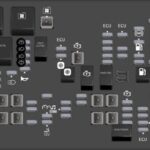The Obd2 P0172 code indicates a “System Too Rich (Bank 1)” condition in your vehicle’s engine. This is a generic powertrain code, meaning it applies to all OBD-II equipped vehicles, although specific repair steps can vary depending on the make and model. As a car owner or enthusiast, understanding what this code means, its potential symptoms, causes, and fixes is crucial for maintaining your vehicle’s health and performance.
Decoding the P0172 Code: System Too Rich Explained
Essentially, the P0172 code is triggered when the oxygen sensor in Bank 1 detects an excessively rich air-fuel mixture in your engine’s exhaust. “Rich” signifies that there is too much fuel and too little oxygen in the combustion process. On engines with multiple cylinder banks (V6, V8, V10), Bank 1 is the side of the engine that contains cylinder number one. It’s worth noting that the P0172 code is closely related to P0175, which indicates a “System Too Rich (Bank 2)” condition, and both codes can sometimes appear simultaneously.
Recognizing the Symptoms of a P0172 Code
In many cases, you might not immediately notice significant drivability issues when the P0172 code appears. However, subtle symptoms can indicate an underlying problem. These can include:
- Engine Misfire: An overly rich mixture can lead to incomplete combustion, causing the engine to misfire.
- Decreased Fuel Economy: Excess fuel consumption is a direct consequence of a rich condition, leading to more frequent trips to the gas station.
- Poor Engine Performance: The engine might feel sluggish or less responsive than usual.
- Smell of Fuel from Exhaust: Unburnt fuel exiting the exhaust system can create a noticeable fuel odor.
- Check Engine Light Illumination: This is the most obvious symptom, as the check engine light will illuminate on your dashboard to alert you to the problem.
Pinpointing the Causes of a P0172 Code
Several factors can contribute to a P0172 code. Identifying the root cause is essential for effective repair. Common culprits include:
- Dirty or Faulty MAF (Mass Air Flow) Sensor: The MAF sensor measures the amount of air entering the engine. A dirty or malfunctioning sensor can provide inaccurate readings, leading the engine control unit (ECU) to inject too much fuel. Notably, using “oiled” air filters can contaminate the MAF sensor if the filter is over-oiled. Some vehicles are also prone to MAF sensor issues due to silicone potting material leaks.
- Vacuum Leaks: Vacuum leaks can introduce unmetered air into the engine, disrupting the air-fuel ratio. While seemingly causing a lean condition, the ECU might overcompensate by adding more fuel, eventually resulting in a rich condition and the P0172 code.
- Fuel Pressure or Delivery Problems: Excessive fuel pressure or issues with fuel injectors can lead to over-fueling. This could be due to a faulty fuel pressure regulator, a clogged fuel filter, or malfunctioning fuel injectors that are leaking or stuck open.
Troubleshooting and Solutions for a P0172 Code
Addressing a P0172 code requires a systematic approach to diagnosis and repair. Here are some possible solutions to investigate:
- Inspect Vacuum and PCV Hoses: Thoroughly examine all vacuum hoses and PCV (Positive Crankcase Ventilation) hoses for cracks, leaks, or disconnections. Replace any damaged hoses.
- Clean or Replace the MAF Sensor: Locate the MAF sensor (consult your vehicle’s service manual if needed). Carefully remove it and clean the sensor element using a specialized MAF sensor cleaner or electronics cleaner. Ensure it is completely dry before reinstalling. If cleaning doesn’t resolve the issue, the MAF sensor may need replacement.
- Check Fuel Lines and Pressure: Inspect fuel lines for any signs of cracks, leaks, or pinches that could affect fuel delivery. Check the fuel pressure at the fuel rail using a fuel pressure gauge to ensure it is within the manufacturer’s specifications.
- Evaluate Fuel Injectors: Dirty or malfunctioning fuel injectors can cause over-fueling. Consider using a fuel injector cleaner to see if it improves the situation. In some cases, professional fuel injector cleaning or replacement might be necessary.
- Examine for Exhaust Leaks: While less likely to be the primary cause of a P0172 code, exhaust leaks before the first oxygen sensor can sometimes influence sensor readings. Inspect the exhaust system for any leaks.
Seeking Further Assistance with P0172
If you’re still encountering difficulties with the P0172 trouble code after trying these solutions, or if you want to connect with a community of car repair enthusiasts, we encourage you to post your question in our FREE car repair forums. Sharing your specific situation and vehicle details can lead to valuable insights and assistance from experienced members.
Disclaimer: This information is intended for informational purposes only and should not be considered professional repair advice. We are not liable for any actions taken on your vehicle based on this information. All content is copyright protected.

